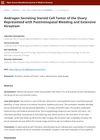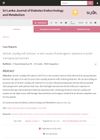 December 2020 in “Research Square (Research Square)”
December 2020 in “Research Square (Research Square)” 150 kHz Electromagnetic Radiation seems to reduce the number and size of ovarian cysts in rats with PCOS, with minimal changes in developing follicles.
November 2020 in “AACE clinical case reports” A woman's severe male hormone excess was caused by a small, hard-to-find ovarian tumor.
[object Object] April 2019 in “Journal of the Endocrine Society” A woman's severe insulin resistance improved with treatment, but she still had high testosterone levels due to ovarian issues.
 November 2018 in “Endocrine Abstracts”
November 2018 in “Endocrine Abstracts” A woman's high testosterone levels were caused by a rare ovarian tumor, not the initially diagnosed condition.
 September 2018 in “International journal of biosciences”
September 2018 in “International journal of biosciences” Gingivitis may increase a hormone linked to ovarian function in women with a certain ovary condition, and treating gum disease could help manage it.
 December 2013 in “Open Access Macedonian Journal of Medical Sciences”
December 2013 in “Open Access Macedonian Journal of Medical Sciences” A woman's excessive hair growth and high testosterone were caused by a rare ovarian tumor, which was successfully treated with surgery.
 December 2013 in “Macedonian Journal of Medical Sciences”
December 2013 in “Macedonian Journal of Medical Sciences” Ovarian steroid cell tumors should be considered in adults with hirsutism and high testosterone, with surgery as the main treatment.
 October 2012 in “Sri Lanka Journal of Diabetes Endocrinology and Metabolism”
October 2012 in “Sri Lanka Journal of Diabetes Endocrinology and Metabolism” A rare ovarian tumor caused hair loss in a post-menopausal woman, which almost completely stopped after surgery.
 March 2012 in “Journal of the American Academy of Dermatology”
March 2012 in “Journal of the American Academy of Dermatology” Treating ovarian-related inflammation may help hair regrowth in women with alopecia areata.
 March 2012 in “Journal of the American Academy of Dermatology”
March 2012 in “Journal of the American Academy of Dermatology” African Americans lack knowledge about laser hair removal safety, Nd:Yag laser treatment is effective with high satisfaction, pressure during surgery can cause hair loss, and treating ovarian inflammation may help with alopecia areata.
 September 1997 in “Journal of the European Academy of Dermatology and Venereology”
September 1997 in “Journal of the European Academy of Dermatology and Venereology” Hirsute women with ovarian-sourced hirsutism are more likely to have irregular periods, with higher BMI and altered hormone ratios.
April 2020 in “International journal of reproduction, contraception, obstetrics and gynecology” A postmenopausal woman with hair loss and hirsutism improved after surgery to remove an ovarian tumor.
January 2020 in “International Journal of Trichology” Androgen-producing ovarian tumors can cause male-pattern hair loss in women.
 62 citations,
August 2018 in “Frontiers in Endocrinology”
62 citations,
August 2018 in “Frontiers in Endocrinology” Androgens are important for normal ovarian function and estrogen production, but may not be the main cause of follicle death.
 57 citations,
October 2013 in “international journal of endocrinology and metabolism”
57 citations,
October 2013 in “international journal of endocrinology and metabolism” Female pattern hair loss is common, linked to polycystic ovarian syndrome, and treated with topical Minoxidil.
 20 citations,
January 2012 in “International Journal of Trichology”
20 citations,
January 2012 in “International Journal of Trichology” Most cases of excessive hair growth in women are caused by polycystic ovarian syndrome and are linked to higher free testosterone levels.
 12 citations,
January 2004 in “Reproductive biomedicine online”
12 citations,
January 2004 in “Reproductive biomedicine online” Low-dose anti-androgen drugs and certain drug combinations are effective for hirsutism, and insulin sensitizers show promise, especially for those with polycystic ovarian syndrome.
 8 citations,
June 2016 in “Journal of Cosmetic Dermatology”
8 citations,
June 2016 in “Journal of Cosmetic Dermatology” Women with persistent acne and high levels of antimullerian hormone are more likely to have polycystic ovarian syndrome.
2 citations,
July 2012 in “Obstetrics, gynaecology and reproductive medicine” Hirsutism in women often indicates health issues like polycystic ovarian syndrome and is treated with lifestyle changes, medication, and cosmetic measures.
 January 2023 in “Archives of Disease in Childhood Education & Practice”
January 2023 in “Archives of Disease in Childhood Education & Practice” Hirsutism in teens is often due to polycystic ovarian syndrome and needs careful assessment and support.
 September 2022 in “Journal of Contemporary medical practice”
September 2022 in “Journal of Contemporary medical practice” Most women with Polycystic Ovarian Disease have trouble getting pregnant due to hormonal imbalances, but lifestyle changes and certain drugs can help.

Many young women have Polycystic Ovarian Syndrome (PCOS), which is often linked with irregular periods, depression, low self-esteem, and insomnia. Lifestyle and diet changes, along with regular counseling, can help manage these symptoms.
August 2021 in “Pediatrics in review” The girl's hirsutism and menstrual issues were caused by a benign ovarian tumor, which was successfully removed.
 January 2019 in “Obstetrics & Gynecology International Journal”
January 2019 in “Obstetrics & Gynecology International Journal” Hormonal changes and conditions like polycystic ovarian syndrome are major causes of adult acne in women, with varying prevalence among different ethnicities.
 August 2018 in “Ayurlog: national journal of research in ayurveda science”
August 2018 in “Ayurlog: national journal of research in ayurveda science” Polycystic Ovarian Syndrome (PCOS) can be effectively treated with Ayurvedic dietary management.
[object Object] June 2015 in “Obstetrics, gynaecology and reproductive medicine” Hirsutism, excessive hair growth in women, is often caused by polycystic ovarian syndrome and is treated by targeting the cause, lifestyle changes, and medication.
 January 2024 in “Theranostics”
January 2024 in “Theranostics” HDAC6 helps keep ovarian follicles dormant, extending female fertility.
 May 2021 in “Journal of the Endocrine Society”
May 2021 in “Journal of the Endocrine Society” A rare ovarian cancer with a good outlook was found in a woman with unusual hair growth and abdominal symptoms.
 April 2017 in “Journal of Pharmaceutical Investigation”
April 2017 in “Journal of Pharmaceutical Investigation” Indole-based compounds improved ovarian health in rats with PCOS, with L-Tryptophan and Tryptophol being most effective.
 December 2006 in “Annales D Endocrinologie”
December 2006 in “Annales D Endocrinologie” Estrogen-progestin contraception lowers ovarian, endometrial, and colon cancer risk but may raise breast and cervical cancer risk, helps with menstrual and acne issues, and new methods are as effective as pills. Metformin helps overweight women with PCOS and insulin resistance, and dopamine agonists treat prolactinomas.






















